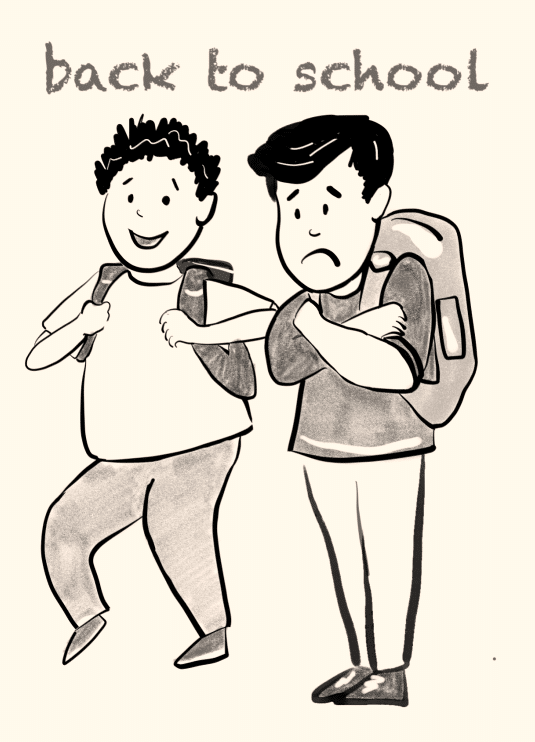
How Going Gluten-Free Transformed our Home
Hi, I’m Melissa, Beth asked me to explain how going gluten-free made a difference in our household. I have a

Yet again, Harry is considering changing schools: new school = stress.
I believe that the different school is a good choice for his final years of education, and therefore, I’m doing all I can to support him in this transition.
Getting a good night’s sleep is essential for children to perform at their best at school, and sleep routines often slide over the holidays. Harry finds it difficult to get to sleep. Read my thoughts on helping a child with dyslexia get to sleep here.
Before school starts, adjust bedtime back to when they will need to go to bed on a school night and wake them earlier in the mornings to get used to getting up on time.
Even though Harry is fifteen, we set him a bedtime during term and don’t allow him to charge his phones or computers in his bedroom.
A friend told me the police had noticed a rise in domestic violence call-outs at night linked to parents trying to get their child’s phone. This anecdote rings true in my house, where the nightly battle to get my son’s phone is far too stressful. I discovered that we can block his iPhone’s internet connection between 10.30 pm and 6.30 am by using an app called OurPact parental control: https://ourpact.com/. We are looking into it. The good thing about using this app is that he can still have his phone in his room and listen to music or audiobooks. Harry may be tech-savvy enough to work out a way to disable the app, but I will try it.
For most children with dyslexia, time management is a huge problem. See my post on teaching a dyslexic child the time here.
Practice runs of where to be dropped off and picked up can help reduce first-day nerves. Also, a school walkthrough is a good idea if permitted before the first day. Talk with your child about what to do if busses are late or cancelled if this is how they travel to school. Make sure you have contact numbers on your child’s phone if they have one and that you have the school office number on your phone.
Having good organization at home helps. Keep things like shoes, coats and keys in a set place. Encourage your child to pack their bag the night before and check they have everything. Harry had a sign-in day last week, and although I got him up at 8.30 am for his 11 am start, he decided to pump up his bike tyre at 10.55 am!
A few years ago, Lord Robert Winston made a television series called Child of our Time. In it, he analysed the factors that helped a child succeed in school. Surprisingly, one of his top tips was ensuring your child does not look like the odd one out.
When I started high school, my mother bought me a blue vinyl shopping bag. It was the most uncool schoolbag ever! I eventually had to cut the handles with scissors because the thing refused to wear out.
Not allowing me to have a ‘normal’ schoolbag was like attaching a ‘kick me’ notice to my back. I appreciate you may not be able to keep up with all the latest fashions for your child (who can?), but making sure their bag is typical for their age may help them avoid the attention of school bullies.
During the holidays, kids seem to be constantly grazing. Encourage your child to eat at mealtimes and get back into the habit of having breakfast. Once back at school, breakfast is essential to fuel a child’s learning. Even at sixteen, we still make Harry’s breakfast during term time because he isn’t organized enough to cook it himself. Most days, he has eggs or high-protein food such as sausages or bacon, as sugary cereals don’t sustain him until morning break.
I use my Google calendar on my computer, but I still have a large wall calendar in the kitchen with a month-to-view layout and columns for each family member. Now that Harry and his sister have part-time jobs, their shifts must go on the planner so we know where everyone is. Please don’t make my mistake. When I went to the shop and asked for “a family planner,” the assistant almost fell over. I think she thought I was looking for contraception. I explained I wanted a calendar with space for everyone to write their activities, and she said, “Oh, you mean a household organizer.”
In my book Dyslexia. Wrestling with an Octopus, I mention the benefit of arranging meetings with key staff members as soon as possible. I never wait for the meet the teacher evening. Call and schedule an appointment in the first week to ensure your child gets the support they need.
The significant difference between primary and secondary school is the number of teachers your child will have. When Harry was in primary school, I made an appointment to meet his teacher in the first week of the school year. I shared his dyslexia assessment information and discussed the classroom and homework accommodations he required.
Now that Harry is in secondary school, contacting his teachers is more complicated. To assist with the transition from primary to secondary school, I emailed the Head of Faculty for Student Support at the end of term four at primary school and made an appointment. When we met, we discussed Harry’s requirements, and right at the start of his secondary school term, she sent all of his teachers an email detailing his learning needs.
At the beginning of each new school year, I request the learning support teacher resend his learning support information to all his new teachers. Sadly, even with this, Harry doesn’t always get the support he needs. Her email is a start, but I still deal with teachers as issues arise throughout the term. Sometimes, teachers forget to organise a reader/writer for Harry’s tests. Once, he got detention for seeking clarification on a task—this made me particularly cross because the staff member had been told about Harry’s auditory processing issues.
These days, Harry grunts as he cycles off. I interpret this to mean, “Love you, Mum.”
Nicola Bailey, the parenting coach I mentioned earlier, says children may feel anxious given the family’s extra time together during the holidays.
“Younger children often show their distress through tears and being clingy, but older children can often feel very anxious at the point of parting even though they may not show outward signs.
Make a routine out of a single hug and kiss and a sentence that the child will acknowledge as your commitment to them; it may go something like: ‘I love you, have a lovely day, and I can’t wait – for you to tell me all about it / to see you at 3 pm / to hear your adventures.’
Talking with your child about what makes them anxious can help lower their stress levels. The Parenting Place website has an excellent article on how to help your child cope with back-to-school anxiety.
Saying things like, “That sounds scary” instead of “There’s nothing to worry about,” and “Okay, what shall we do about this?” instead of “Here – this is what you should do” helps your child know you support them. I have found sitting on Harry’s bed at the end of the day is the best way for him to download his worries.
I taught my son to read and spell in 30 minutes a day. Here are my affiliate links to the resources I used: All About Spelling and All About Reading.
If your child also struggles to learn the multiplication tables, check out this blog post about using stories to help them remember the facts.
Speechify is an app that can help children at school by reading text from websites. Here is my affiliate link.

Hi, I’m Beth. Seven years ago, when I discovered my son had dyslexia, I had a ‘light-bulb’ moment and understood this explained many of my own difficulties. Ever since, I’ve been on a mission to discover the best ways to wrestle what I like to call the dyslexia octopus.

Hi, I’m Melissa, Beth asked me to explain how going gluten-free made a difference in our household. I have a

I need nighttime anxiety relief. It’s 4 AM, and I’m reviewing what happened to Harry at school yesterday and wondering